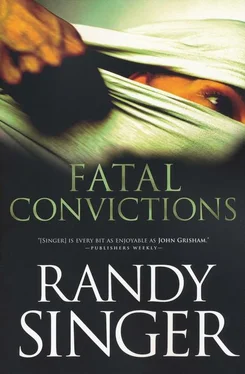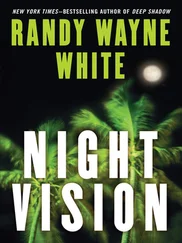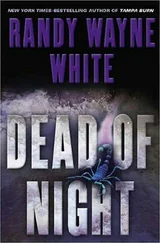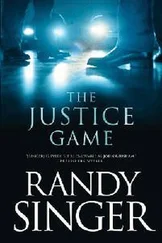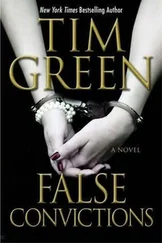Randy Singer - Fatal Convictions
Здесь есть возможность читать онлайн «Randy Singer - Fatal Convictions» весь текст электронной книги совершенно бесплатно (целиком полную версию без сокращений). В некоторых случаях можно слушать аудио, скачать через торрент в формате fb2 и присутствует краткое содержание. Жанр: Криминальный детектив, на английском языке. Описание произведения, (предисловие) а так же отзывы посетителей доступны на портале библиотеки ЛибКат.
- Название:Fatal Convictions
- Автор:
- Жанр:
- Год:неизвестен
- ISBN:нет данных
- Рейтинг книги:3 / 5. Голосов: 1
-
Избранное:Добавить в избранное
- Отзывы:
-
Ваша оценка:
- 60
- 1
- 2
- 3
- 4
- 5
Fatal Convictions: краткое содержание, описание и аннотация
Предлагаем к чтению аннотацию, описание, краткое содержание или предисловие (зависит от того, что написал сам автор книги «Fatal Convictions»). Если вы не нашли необходимую информацию о книге — напишите в комментариях, мы постараемся отыскать её.
Fatal Convictions — читать онлайн бесплатно полную книгу (весь текст) целиком
Ниже представлен текст книги, разбитый по страницам. Система сохранения места последней прочитанной страницы, позволяет с удобством читать онлайн бесплатно книгу «Fatal Convictions», без необходимости каждый раз заново искать на чём Вы остановились. Поставьте закладку, и сможете в любой момент перейти на страницу, на которой закончили чтение.
Интервал:
Закладка:
But Khalid was determined to love her back to a full recovery. What else could he do?
He read to her for hours each day from the Qur’an, an activity that soothed her and moderated her mood swings. She joined him in the salats as well-from her hospital bed the first few days but on her prayer mat after that. Still, she seemed to lack the religious fervor of the woman Khalid had been married to for thirty-two years. It was this aspect of her personality change that gave him the most heartache.
The doctors said he could take Ghaniyah home in a few days, a prospect that terrified Khalid. His wife wasn’t ready to be left alone-you could tell that by looking in her vacant eyes. But the insurance company was insisting that she could recover at home with outpatient therapy just as well as she could at the hospital. For Khalid, it felt like she would be out of sight and out of mind, the neuropsychologists and brain-injury specialists moving on to the next patient.
These thoughts preoccupied him as he watched the news on Thursday evening while shuffling through some papers. Lying on the bed, Ghaniyah dozed in and out.
The subject matter of a local news story caught his attention-a teenage Muslim girl being discriminated against because she wanted to wear a hijab to work. The young lady was not a member of Khalid’s mosque, but he admired her boldness. It seemed a little strange that she was so insistent on working in a surf shop, but then again, who could understand the mind of a teenage girl? At least she had the courage to stand up for her convictions, even if it made her feel like an outcast.
When the story segued to the courthouse steps, Khalid almost dropped his papers on the floor.
“Him?” Khalid said out loud when Alex’s face first appeared on the screen. Khalid reached for the remote and turned up the volume.
The same lawyer he had met in Ghaniyah’s room last week was explaining how he had landed his client a job at a competing surf shop. He talked about the importance of a pluralistic society and accommodating one another’s religious beliefs. He talked about accepting people for who they were instead of turning them all into Madison Avenue clones. His client stood beside him, beaming at the prospect of working at Burke’s Surf Shop.
When the news moved on to the next story, Khalid turned down the volume and thought about what he had just seen. Maybe he had misjudged the Reverend Alexander Madison. The man hadn’t seemed like a crusader when he came into Ghaniyah’s hospital room; he had seemed like a sleazy, opportunistic lawyer. Maybe he was. But Khalid had to give the man credit-Mr. Madison was resourceful. And they certainly needed that type of lawyer for Ghaniyah’s case… if she had a case at all.
Ghaniyah couldn’t remember the impact or the events that immediately followed, but she remembered what led up to the accident. A tractor trailer had pulled out to pass her on North Landing Road-a narrow, two-lane road that wound through the southern part of Virginia Beach. When an oncoming vehicle appeared around the corner, the driver of the tractor trailer swerved back into Ghaniyah’s lane even though his rig was not all the way past her. Ghaniyah had no choice but to swerve to the right. The last thing she remembered was her tires leaving the pavement as she careened toward a pine tree.
Now Khalid faced piles of medical bills and perhaps long-term care for Ghaniyah. If the driver of the tractor trailer had caused the accident, why shouldn’t he pay for the consequences?
They just had to locate him first. The driver hadn’t stopped, and the police had no leads. But one of the men in Khalid’s mosque had worked as an insurance adjuster. He explained to Khalid that such events might be compensable under the uninsured motorist provisions of his automobile policy.
Khalid quietly searched Ghaniyah’s room for Mr. Madison’s card. When he couldn’t find it, he pulled up the firm’s Web site and wrote down the office number. He would call Mr. Madison as soon as Ghaniyah was released from the hospital and things settled down a bit. What could it hurt?
A Muslim imam and a Christian pastor. This could make for some interesting dynamics.
10
twenty-five years earlier beirut, lebanon
Hassan Ibn Talib, like every assassin, was once a child.
At five years old, he and his siblings had gathered on the living room rug each night for lessons in Islam taught by his mother. She began by placing the Qur’an on the coffee table with great reverence. The book was frail, its pages yellow and worn. When his mother opened it, a mustiness filled the air, transporting the children in time and place to the mighty battles between Muslim warriors and Jewish infidels. To be sure, there were pages of long and confusing teachings and sayings that a young boy did not understand. But there was also lots of action, and nobody could bring the old stories to life better than Hassan’s mother.
She was ordinarily a quiet woman, stern with her children, respectful of her husband in public. But when it came time for the lessons, her demeanor changed, and the almond eyes intensified with the spark of a true believer. Hassan had learned the hard way that horseplay, whispering, and poking at his siblings would earn him the switch.
On some nights, like tonight, his mother would read a few verses from the Qur’an and then launch into a story that Hassan had never heard before. Like all the best stories, this one was about a true hero.
“Our third imam, Imam Hussein, was a man of faith and action. He worshiped Allah and would carry sacks of food to the houses of the poor at night, cheering them up. He would always tell his followers, ‘Be in touch with the needy, for Allah does not love the arrogant.’”
Hassan didn’t understand the word arrogant, but he already liked Imam Hussein. Hassan’s simple view of the world, fostered by his mother’s stories, was black and white. Good guys and bad guys. Muslims and Jews. Imam Hussein would be a good guy. Strong in battle. A slayer of Jews.
“But during the time of Imam Hussein, an evil ruler named Yazid Ibn Muawiya rose to power and made everybody accept his leadership. Everybody except Imam Hussein and a few brave followers, that is. Imam Hussein was the true successor to the Holy Prophet Mohammed, and he would not bow to the leadership of somebody as evil as Yazid.”
Hassan’s little hand shot up in the air. His brother gave him a look of disdain.
“Yes, my son.”
“What does successor mean?”
His mother smiled. “Imam Hussein was the grandson of the Great Prophet Mohammed. He was supposed to take over for Mohammed when Mohammed died.”
“Oh.”
“That’s a stupid question,” Hassan’s brother whispered, drawing an evil eye from their mom.
“So the people of Kufa, who were followers of Imam Hussein, invited him to come to their city and lead them in revolt against Yazid and his army. But on the way to Kufa, Imam Hussein and his family were met by a large army of men. The men surrounded the camp of Imam Hussein and would not allow his people to get food or drinking water. For days, Imam Hussein, his family, and his followers were not allowed to leave their encampment while the army gathered reinforcements and grew. Eventually, there were 30,000 warriors.” Hassan’s mother emphasized the number and then, as the expert storyteller, paused for effect.
“How many did Imam Hussein have?” Hassan asked. This time, he forgot to raise his hand.
“Seventy-two.”
Huh? Even for a young boy, the odds seemed overwhelming.
“For eight days, the blistering hot sun scorched the desert sands as Imam Hussein waited for the people of Karbala, a nearby city, to rally to his support.”
Hassan’s mother lowered her voice. “To their great shame, the people of Karbala never came. And so, after more than a week of no food or water, many of Imam Hussein’s followers became so dry that they could not swallow, their tongues sticking to the roofs of their mouths. That’s when the imam took his six-month-old son in his arms and walked toward Yazid’s army, holding his baby up so the leaders could see that the boy was dying. He asked them to take the baby and give the child water even if they intended to kill Hussein.”
Читать дальшеИнтервал:
Закладка:
Похожие книги на «Fatal Convictions»
Представляем Вашему вниманию похожие книги на «Fatal Convictions» списком для выбора. Мы отобрали схожую по названию и смыслу литературу в надежде предоставить читателям больше вариантов отыскать новые, интересные, ещё непрочитанные произведения.
Обсуждение, отзывы о книге «Fatal Convictions» и просто собственные мнения читателей. Оставьте ваши комментарии, напишите, что Вы думаете о произведении, его смысле или главных героях. Укажите что конкретно понравилось, а что нет, и почему Вы так считаете.
